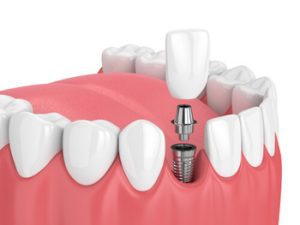When considering dental implants, Bangkok may seem appealing compared to Australia because of the cheaper costs. Dental implants are a crucial investment in dental health, so it is crucial to understand the differences in materials, quality standards, costs, types, and procedures between these two locations.
This article will tap into these aspects in detail, helping you make a well-informed decision that prioritises your dental health and overall well-being so that you can flaunt a flashy smile for years.
Understanding Dental Implants
Dental implants are mostly created from titanium to offer a long-term solution for missing teeth. Dental implants are a known option for replacing missing teeth and restoring function and aesthetics.
What Are Dental Implants?
Dental implants are artificially made tooth roots that provide an enduring base for fixed or removable replacement teeth.
Unlike dentures or bridges, dental implants are placed during surgery into the jawbone, where they fuse with the bone through a process known as osseointegration.
Benefits Of Dental Implants’ Treatment

Dental Implants In Bangkok
Bangkok has become a popular destination for dental tourism, attracting people with the promise of lower costs and shorter waiting times. However, weighing these benefits against potential risks and differences in quality standards is important.
Cost Of Dental Implants In Bangkok
Bangkok is known for offering dental treatments at significantly lower costs than Australia. This lower cost can be attributed to many factors, such as lower operational costs, differences in living expenses, and varying standards of care. While the cost savings might be appealing, it’s important to consider other aspects before making a decision.
Quality Standards And Materials
The quality of materials and the standards of care in Bangkok may differ from those in Australia. While there are reputable dental clinics in Bangkok, the overall regulatory framework may not be as stringent as Australia’s. This can impact the consistency and reliability of the treatments provided.
The Appeal Of Dental Tourism In Bangkok
Dental tourism in Bangkok offers the allure of affordable prices and the chance to combine dental treatment with a vacation. Many dental clinics in Bangkok offer services to international patients. However, it’s essential to be diligent to ensure you minimise the potential risks that come with dental tourism.
Dental Implants In Australia
Australia is renowned for its high standards of healthcare, including dental treatments.
Australia’s dental implant treatments are governed by the Australian Health Practitioner Regulation Agency (AHPRA), ensuring high standards of care. Dental professionals in Australia adhere to strict guidelines and continuous professional development, which guarantees that patients receive outstanding treatment using the best materials available.
Types Of Dental Implants Available
In Australia, the field of dental implantology offers a range of advanced solutions to cater to diverse patient needs and preferences. Each type of dental implant surgery is meticulously designed to address specific dental issues, ensuring a customised approach to replacing missing teeth. Here’s an in-depth look at the various types of dental implants available, each offering unique benefits and considerations.
Single-Tooth Implants
Single-tooth implants represent an ideal solution for individuals needing to replace a missing tooth. This type of implant entails the placement of a titanium implant post into the jawbone through surgery, which makes a good foundation for a custom-made dental crown.
Single-tooth implants are particularly advantageous for those who have lost a tooth because of events like trauma, decay, or other dental issues. They offer several benefits, including:
- Natural Aesthetics: The custom crown is crafted to match the colour, shape, and size of adjacent teeth, providing a seamless and natural appearance.
- Preservation Of Adjacent Teeth: Single-tooth implants do not require the movement of adjacent teeth, preserving their natural integrity.
- Enhanced Functionality: Implants restore full chewing function and can improve speech, making them a practical and effective solution for tooth replacement.
Several-Teeth Implants
When multiple teeth are missing, several-teeth implants provide a versatile and durable solution. This approach typically involves placing implants to support a dental bridge or a series of connected crowns. The implants act as anchors for the bridge, which is custom-designed to fill the gaps left by missing teeth.
This type of implant is particularly beneficial for patients who have lost several teeth in a row, whether due to injury, decay, or other reasons. The benefits of several-teeth implants include:
- Structural Integrity: By supporting a bridge, several-teeth implants help maintain the jawbone’s structure and prevent adjacent teeth from shifting. This helps preserve the overall alignment and health of the mouth.
- Restored Function: Dental implant bridges work with the implants to restore normal biting and chewing functions, improving oral health and comfort.
- Enhanced Aesthetics: The bridge is designed to blend seamlessly with existing teeth, offering a natural and aesthetically pleasing result.
All Teeth (Fixed)
Fixed dental implants offer a robust and permanent solution for patients who require a complete replacement of existing or missing natural teeth in the upper or lower jaw. This method involves the placement of multiple implants to assist a full arch of prosthetic teeth, which are securely fixed in place. The result is a complete set of replacement teeth that do not need to be removed for cleaning or maintenance.
The all-teeth-fixed implant option is ideal for individuals who have lost all their teeth due to extensive tooth decay, gum disease, or other oral or dental issues. The key advantages include:
- Permanent Solution:
Fixed implants provide a long-term solution with a high level of stability and functionality, closely mimicking the natural feel and performance of real teeth.
- Improved Comfort: As the prosthetic teeth are permanently fixed, there is no need to worry about removable dentures or potential issues with fit and stability.
- Enhanced Oral Health: Fixed implants help preserve jawbone density and support the structure of the face, which can lead to a more youthful appearance.
All Teeth (Removable)
Removable implant-supported dentures offer a flexible alternative for patients needing to replace a whole arch of teeth. This type of implant involves placing implants into the jawbone to support a set of dentures that can be taken off for cleaning and maintenance. While these implant dentures are not fixed in place like their all-teeth-fixed counterparts, they offer several notable benefits:
- Ease Of Maintenance: The ability to remove the dentures allows for thorough cleaning, contributing to better oral hygiene and overall health.
- Cost-Effectiveness: Removable implant-supported dentures are often more affordable than fixed options, providing a viable solution for those on a tighter budget.
- Adjustable Fit: Since the dentures can be removed, changes can be made to ensure an ideal fit, accommodating any changes in the mouth over time.
Choosing the Right Type Of Implant
The number of missing teeth, the density of the jawbone, and the patient’s personal preferences all influence the type of dental implant that is appropriate for them. An experienced dental professional is essential for identifying the optimal treatment plan adapted to your unique requirements.
Factors Changing The Cost Of Dental Implants In Australia
Several variables influence the cost of dental implants in Australia. Understanding these variables may help you plan and budget for your treatment more effectively.
- Type Of Implant: Single-tooth implants, multiple implants, and full-arch implants have different cost structures. The type of implant needed will significantly impact the overall cost.
- Materials Used: The choice between titanium and ceramic zirconia can affect the overall cost. Titanium is a common material used for dental implants due to its durability and biocompatibility with bone. Ceramic zirconia, while more aesthetically pleasing, can be more expensive.
- Complexity Of The Procedure: The cost will increase for more complex cases requiring bone grafting or sinus lifts. Patients with insufficient bone density may need additional procedures to prepare the jaw for implant placement.
- Dental Clinic Location: Clinics in metropolitan areas may have higher costs due to increased operational expenses. However, these clinics may also offer advanced technology and experienced professionals.
What To Expect When Getting Dental Implants In Australia
Understanding the process of getting dental implants in Australia can help you prepare for the procedure and know what to expect at each stage.
Initial Consultation
Your dental implant journey starts with an in-depth initial consultation, where your dentist will examine your dental health, discuss your needs, and create a personalised treatment plan. This consultation typically includes a thorough examination, diagnostic imaging, and a discussion of your medical history.
Diagnostic Imaging
Diagnostic imaging, like X-rays or CT scans, evaluates your jawbone structure and determines the best placement for the implants. These images help the dentist plan the procedure with precision, ensuring optimal outcomes.
Implant Placement
The dental implant procedure involves putting the implant post within the jawbone. This is typically done under local anaesthesia, ensuring minimal discomfort. The procedure may also include sedation for patients who experience anxiety or discomfort during dental treatments.
Healing And Osseointegration
After the implant is placed, it must heal before it integrates with the jawbone. This process, known as osseointegration, is crucial for the implant’s stability and success. Depending on individual factors, the healing period can vary from a few weeks to several months.
Abutment And Crown Placement
Once the implant has been integrated, an abutment is connected to the implant post, followed by the crown. The crown is custom-made to match the colour and contour of your natural teeth, resulting in a cohesive and natural appearance.
Aftercare And Maintenance
Proper aftercare and maintenance are critical to the longevity of your dental implants. Regular dental check-ups, excellent oral hygiene, and avoiding hazardous behaviours like smoking are essential. Your dentist will provide extensive information on how to care for your implants and keep your mouth healthy.
Making Dental Implants Affordable In Australia
While dental implants might be an expensive option, there are various ways to make them cost-effective in Australia. Exploring these possibilities can help you save money without sacrificing quality.
Payment Plans And Financing Options
Many dental clinics in Australia offer flexible payment and financing plans to make implants more affordable. These plans help spread the cost over manageable instalments, allowing patients to receive treatment without financial strain.
Health Insurance
Check with your health insurance company to see if they cover dental implants. Some insurance plans offer partial coverage for implant treatments, reducing your out-of-pocket expenses. Knowing your policy and understanding the extent of your coverage are important.
Clinic Special Offers
Many dental clinics in Australia offer special promotions and discounts on dental implants to make them accessible to a broader range of individuals. Such offers may incorporate free or discounted 3D scans.
Frequently Asked Questions
Are dental implants painful?
The dental implant surgery is performed under local anaesthesia, ensuring minimal discomfort. Most patients report only mild discomfort during the healing process. Your dentist will provide pain management options to ensure your comfort.
How long do dental implants last?
Dental implants, with proper care and management, can last a lifetime. Regular dental check-ups, when required, and proper oral hygiene habits are critical to their longevity. It’s important to follow your dentist’s recommendations and address any issues promptly.
Can anyone get dental implants?
Most people with good oral and general health are appropriate candidates for dental implants. Your dentist will review your case to establish your appropriate number. Bone density, gum health, and medical issues will all be taken into consideration.
What is the average success rate of implant treatments?
Dental implants have a success rate that surpasses 95%. Factors such as proper care, good oral hygiene, and following your dentist’s instructions can contribute to the success of the implants. Your dental expert will discuss potential risks and how to mitigate them.
Are there any restrictions on what I can eat with dental implants?
After dental implants are placed, it’s important to follow a soft-food diet to ensure proper healing and integration of the implant. Avoid very hard or sticky edible items that might damage the implant or restoration. Your dentist will provide specific dietary guidelines based on your individual case.
What happens if I have insufficient bone density for dental implants?
If you lack sufficient bone density, your dental expert may propose a bone grafting treatment to strengthen the bone before inserting the implants.
Bone grafting refers to the process of taking bone or synthetic material from another area of the body to strengthen the jawbone.
This technique helps lay a strong basis for dental implants, assuring their long-term success. Your dental expert will assess your bone density and recommend the most optimal solutions for you.
Can dental implants be done if I have gum disease?
Gum disease may impact the success of dental implants, as healthy gums are crucial for proper implant integration. If you have gum disease, your dentist must first treat the condition before implant placement. Once the gum disease is under control and your oral health is managed, you may be able to carry on with the dental implant procedure.
How long does the dental implant procedure take?
The dental implant procedure typically involves multiple stages, each with its own timeframe. The initial consultation and diagnostic imaging may take a few hours, and the implant placement surgery usually lasts 1 to 2 hours per implant.
After the implant is placed, the healing process, or osseointegration, can take several months. Once healing is complete, the final restoration (crown, bridge, or denture) is placed, which usually takes a few additional appointments.
Overall, the entire process may span several months, depending on individualistic factors and the case’s complexity.
Is it possible to replace missing teeth with implants if there’s an existing medical condition?
Many people with existing medical conditions can still receive dental implants. However, certain conditions, such as uncontrolled diabetes or severe osteoporosis, may impact the success of the implants.
Your dental expert will review your medical history to ensure your condition is well-managed before proceeding with the implant procedure. It’s important to disclose all relevant medical information to your dentist to ensure a pleasant and optimal treatment outcome.
How do I pick the right dental implant clinic for my implants?

Additionally, ensure that the clinic follows strict hygiene and safety protocols and uses high-quality materials. It’s also important to clearly understand the costs involved and any available financing options.
Final Reflections: Investing In Quality Dental Implant Treatment
When considering dental implants’ treatments, weighing the pros and cons of the available treatment options in different locations is essential. While Bangkok may offer lower costs, Australia’s rigorous standards set by AHPRA ensure high-quality care and materials. Understanding the available types of dental implants, the factors influencing their cost, and what to expect during the procedure can help you make an informed decision.
Dental implants in Australia offer a reliable, long-term solution for missing teeth, with various options to meet different needs. Investment in high-quality care and materials can provide significant benefits, including improved aesthetics, function, and oral health. Additionally, flexible payment plans and financing options can make dental implants more cost-effective, allowing you to prioritise your dental health without compromising quality.
Investing in your smile is an investment in your overall well-being, and selecting the right dental clinic and treatment can ensure a successful and satisfying outcome.
If you are considering dental implants, contact Carindale Family Dentist in QLD at (07) 3324 9172. Our team of skilled dental professionals is dedicated to providing optimal care and helping you achieve the smile you’ve always wanted.
Note: Any surgical or invasive procedure carries risks. Before proceeding, you should seek a second opinion from an appropriately qualified health practitioner.
Sources:
British Dental Association. “Dental Tourism: Patients Need to Know the Risks.” British Dental Assocation, 14 July 2022, www.bda.org/news-and-opinion/news/dental-tourism-patients-need-to-know-the-risks. Accessed 26 July 2024.
“Dental Implant Surgery.” Mayo Clinic, 29 Jan. 2019, www.mayoclinic.org/tests-procedures/dental-implant-surgery/about/pac-20384622. Accessed 26 July 2024.
“Full Mouth Dental Implants – American Academy of Periodontology.” American Academy of Periodontology, 21 June 2019, www.perio.org/for-patients/periodontal-treatments-and-procedures/dental-implant-procedures/full-mouth-dental-implants. Accessed 26 July 2024.
Gupta, Ranjan, et al. “Dental Implants.” StatPearls – NCBI Bookshelf, 8 Aug. 2023, www.ncbi.nlm.nih.gov/books/NBK470448. Accessed 26 July 2024.




 Fixed implants provide a long-term solution with a high level of stability and functionality, closely mimicking the natural feel and performance of real teeth.
Fixed implants provide a long-term solution with a high level of stability and functionality, closely mimicking the natural feel and performance of real teeth.